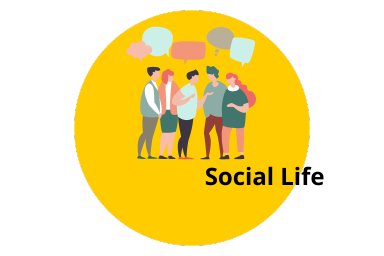
Academics are important during postsecondary education; however, having a social life balances students’ lives as they pursue degrees or credentials on campus. In 1987, Tinto reported that an active social life while enrolled in postsecondary education gives students a strong sense of belonging that comes through friendships, social events, and relationships
Think of the many people who meet lifelong friends or spouses during their postsecondary education years. Many of these relationships last a lifetime, and we all want these relationships for students with ID as well. Countless people report they have found employment because of campus friendships. Social life is truly valuable, isn’t it?
An active social life broadens your view of people from other cultures, religions, ethnicities, and customs. Because many welcome students from all parts of the world, campuses have become an excellent source for students to learn from others who may be different from them. Students learn acceptance, tolerance, and the importance of including everyone as they mingle with people with other backgrounds and experiences.
According to Heibutzki's article in the classroom¸ a site developed to support students, experiencing a social life during postsecondary education may help build your study skills because you study with friends. Students quiz each other, compare notes, and read and discuss material with friends who are in classes with them. Facing the same challenges in classes may help strengthen friendships and encourage lifelong relationships.
Some campuses have event-filled and active social experiences for students, while other campuses may be quiet, especially on weekends because many students return to their homes. Think about what is important for your student’s social life and complete this section that reflect those preferences and needs.
